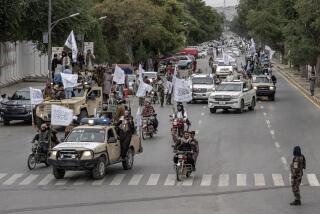Afghanistan Fights for Its Soul : Islamic Self-Determination, Not Soviet Army, Is the Issue
- Share via
Babrak Karmal has stepped down--or has been pushed out--as head of the Marxist government of Afghanistan, and the seventh round of preliminary talks to end Afghanistan’s war are under way in Geneva. A “breakthrough” is now hinted, but eight years after the Soviet-inspired coup, Moscow’s agenda remains the same: recognition of the regime in Kabul, no matter who is in the role of chief puppet.
In an effort to resolve the conflict peacefully, U.N. Undersecretary General Diego Cordovez has made numerous trips between Moscow, Kabul, Islamabad and Tehran in the past four years. These trips, and the six rounds of U.N.-mediated “proximity talks” in Geneva, have now come down to Soviet willingness to offer a timetable for withdrawal of troops from Afghanistan. But first there would have to be nonintervention agreements between Afghanistan and Pakistan, which would require Pakistan to recognize the government in Kabul, and the end of outside support to the Afghan moujahedeen . If this is all that the U.N. special envoy could negotiate after years of effort, the chances are dim in the near future for a peaceful end to the tragic war in Afghanistan.
Most basically, the current proposal does not address the real issue of the war, which is the Afghan people’s desire to establish an Islamic and truly nonaligned government, as expressed by the Islamic Unity coalition of the seven major Afghan resistance groups operating in and out the country. It is critical to point out that the war against the Soviet-imposed communist regime began more than a year before the Soviet invasion of December, 1979, and will continue long after the Soviet troops are withdrawn if the Afghan Communists remain in power.
If agreed upon, the proposal now on the table in Geneva would only legitimize the Soviets’ claim that the principal parties in the conflict are not the Soviets and the moujahedeen , but the regime in Kabul and the so-called outside forces of Pakistan, Iran, China and the United States. If this absurd Soviet claim were confirmed through a U.N. agreement, the Soviets would have a new and more potent “legal fiction” to use for any future invasion and occupation of Afghanistan, if and when they find the survival of their puppet regime in Kabul threatened.
In Geneva, the Soviets also are making the supposedly charitable proposal for repatriation of more than 4 million Afghan refugees living in Pakistan and Iran. This assumption that refugees would flock home when Soviet troops are withdrawn ignores the fact that there were more than 1 million Afghan refuges in Pakistan before the Soviet invasion of 1979, as a result of an continuing armed rebellion against the previous Moscow-allied regime in Kabul. The removal of Afghan refugees from Pakistan may be in the interest of the Pakistan government, but how will that government “repatriate” unwilling refugees back to a regime that forced them to seek refuge in Pakistan in the first place?
Finally, it would be a mistake to believe, as the Soviets allege, that the resistance will collapse if U.S. and Pakistani aid is withdrawn. The moujahedeen resistance is not comparable with the contra movement in Nicaragua. The Islamic-inspired armed struggle, or jihad, in Afghanistan is a truly popular resistance movement. It began and intensified very rapidly inside the country without any meaningful outside help. It could continue for a long time without any substantial aid from the outside, especially now that most Afghans living in the rural areas have become armed over the past seven years of war.
In its present form, therefore, the U.N.-engineered proposal only attempts to address some major symptoms of the conflict; it ignores the causes. As such it may provide a first step toward reaching a peaceful solution, but it cannot be regarded as a comprehensive formula for ending the war in the foreseeable future. That will require a recognition of the rights of the people of Afghanistan to determine their own political future.
The Afghanistan conflict is too complex to be solved through real or imagined proxies. No solution will ever be possible without taking into consideration the wishes of Afghans. They have been struggling for eight years, not only to rid their country of the Soviet Red Army and its puppets in Kabul, but also to establish an Islamic government. Until the Islamic Unity of Afghanistan Moujahedeen is part of the process, the world should take any “breakthrough” at Geneva as only the most preliminary of preliminaries.
More to Read
Sign up for Essential California
The most important California stories and recommendations in your inbox every morning.
You may occasionally receive promotional content from the Los Angeles Times.













